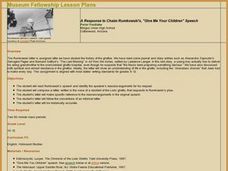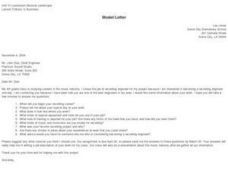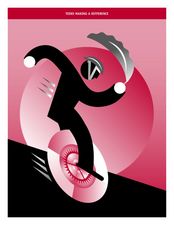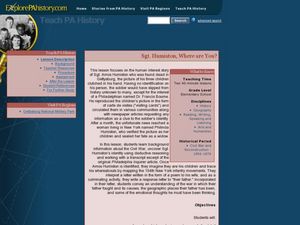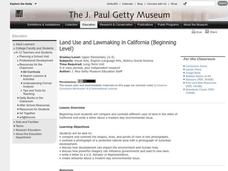Curated OER
A Response to Chaim Rumkowski's, "Give Me Your Children" Speech
Students examine the history of the ghettos and read Rumkowski's letter. Using journal and diary entries, they identify types of resistance used during the Holocaust. Writing a letter, they use references to Rumkowski's original letter...
Curated OER
First Day of School: I'll Get to Know You
Students participate in a letter matching game that pairs students so that they can introduce a new friend. They listen to the Shel Silverstein book, The Giving Tree and write a letter to the class telling them what they will give to the...
Curated OER
Self-Motivating Letters
Students brainstorm reasons for attending a college class, and set goals for themselves to achieve while they are at school. They write letters using these reasons to encourage themselves. Letters are graded by the professor and sent out...
Curated OER
Model Letter
In this model letter worksheet, students review the best format to contact their musical career mentors as they follow the format provided.
Curated OER
Teens Making a Difference
Is your opinion significant? Help your class discover the influence their opinions hold and encourage them to make a positive change in their community. To start, they get in teams and brainstorm why their school should have more healthy...
Edible Schoolyard
Pan de los Muertos
Accompany instruction and the celebration of El Dia de los Muertos with a loaf of Pan de los Muertos. Here, scholars measure ingredients precisely to create tasty bread, write a remembrance for someone who has passed away, and take part...
Curated OER
Instruments From Around the World
How much does the environment affect how and what man creates? Children explore the effect of the environment on primitive man as they research raw materials from a specific location. They use their findings to write a short essay about...
National Gallery of Art
The First African American Regiment
Young historians examine a memorial sculpture of the first African American regiment in the Civil War, and then compare how the experiences of the regiment are portrayed in letters and poetry, as well as in the motion picture, Glory.
Read Works
Famous Inventors Alexander Graham Bell: You Rang?
Scholars read a brief informational text about the famous inventor, Alexander Graham Bell and his invention of the telephone, then show what they know by way of eight questions—six multiple choice and two short answer.
US Mint
Rename That State!
As Shakespeare famously wrote, "A rose by any other name would smell as sweet," but can the same be said for a state? In this elementary geography lesson, students are assigned specific states to research using the information they find...
Chicago Historical Society
Are We the People?
Taking on the roles of a fiery Boston patriot, a Philadelphia merchant's wife, and a prominent abolitionist, your young historians will consider the reactions of these early Americans to the creation of the Declaration of Independence,...
C-SPAN
Electoral College Pros/Cons and Alternatives
If every vote counts, why do we need the electoral college? Middle and high schoolers study the Constitutional precedent of the electoral college, as well as its place in historical and modern elections, with an engaging social studies...
NPR
Is There Really an Immigration Line?
If you've ever looked at the US immigration system, you know that it is complex and a source of controversy. An insightful lesson plan encourages learners to conduct their own analyses of the US immigration system by asking them to...
University of Pennsylvania
Decoding Propaganda: J’Accuse…! vs. J’Accuse…!
Reading snail mail is a great way to go back into history and to understand others' points of view. The resource, the second in a five-part unit, covers the Dreyfus Affair. Scholars, working in two different groups, read one letter and...
DePaul University
Egypt
The country of Egypt is more than just big pyramids and ancient pharaohs. After reading a brief overview of this African nation, young learners will demonstrate their understanding of the text by identifying the main idea and supporting...
Curated OER
Traveling Community Journal Project
Students create an online "community journal". In this communities lesson, students use a writing template to send e-mail to various people to learn more about their community. The journal is passed from person to person.
Curated OER
Dear George Using Census Data
Sixth graders discuss differences in the way in which information was disseminated in George Washington's time and how it is acquired in contemporary times. They examine Census of Agriculture data and a modern day version of a letter...
Curated OER
Sgt. Humiston, Where are You?
Students become familiar with the events of the Civil War. For this identification lesson, students use deductive reasoning to understand how the deceased soldier was identified. Students view primary documents for information about...
Curated OER
Land Use and Lawmaking in California
Students investigate the laws of using land. In this California Government lesson, students examine the many uses of land in California and find an environmental issue they care about. Students write a letter to a politician based on...
Curated OER
A Child's Daily Life in South Africa
Students compare the life of a child in South Africa to the life of a child in America. In this multicultural education instructional activity, students read the book Not So Fast Songololo and discuss the differences and similarities...
Curated OER
We Were Here First
Students explore the legal and historical experience of native peoples living in the United States. They write a letter to their United States senator commenting on the Hawaiian bill using information gathered during their research.
Curated OER
Read to Feed
Students participate in the Read-to-Feed project. In this fundraising lesson, students read books to purchase a farm animal for a family in need. Students write a letter to the family that will be receiving the farm animal.
Curated OER
Where Do I Come From?
Students research immigration from Europe to the United States. In this immigration lesson, students read the book, The Long Way to a New Land. Students use a world map to locate Sweden and other countries in Europe. Students pretend...
Curated OER
Hoboes on Harvest
Students study the role Oklahoma's wheat fields played in the history of labor movements in the US. They write imaginary letters describing their experiences on a wheat harvest. They research on the internet or in encyclopedias to find...


